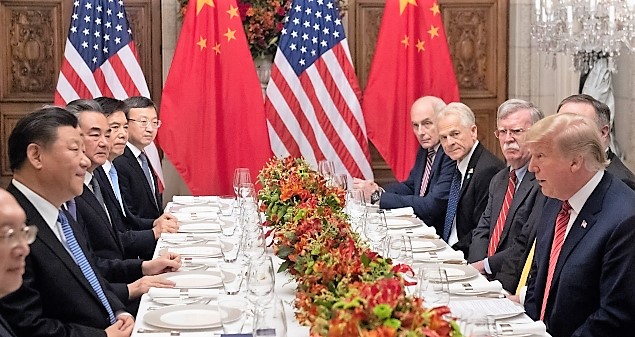
PERHAPS IT was the dessert of caramel-rolled pancakes, crispy chocolate and fresh cream. Or perhaps President Donald Trump had already decided that, during a working dinner on December 1st, he wanted a deal with President Xi Jinping of China. Whatever it was, after sounds of applause drifted out to assembled journalists, the two announced a “highly successful” negotiation. "This was an amazing and productive meeting with unlimited possibilities for both the United States and China,” said Mr Trump.
A more realistic assessment would be that the meeting produced a truce based on two elements: some murky mercantilism, and a deal to talk about a deal. China will increase its purchase of American farm produce, energy and some industrial goods. In exchange America will delay an escalation in tariffs, from 10% to 25% on $200bn of goods planned for January 1st. That is on hold until March 1st at the earliest. But because the formal talks between the two countries could well fail, this truce is worryingly fragile.
The Chinese commitment to raise purchases of American goods is by an amount “not yet agreed upon, but very substantial”. That is supposed to reduce America’s bilateral trade deficit with China. Requiring the Chinese government to manage import flows is odd given how America’s government complains that China still behaves like a non-market economy.
The idea is also economic nonsense. Bilateral trade deficits do not mean much, especially in an age when supply chains are global. In addition, the bilateral trade deficit is not only a function of Chinese imports, but also of Chinese exports to America. Even if the Chinese state can find ways to boost the purchase of American goods, it cannot determine the behaviour of American consumers. They may be eager to buy from China, if only to get hold of products before relations deteriorate again. In the year to date America’s trade deficit in goods has increased by 10%.
The foundations of the deal’s second part are almost as shaky. In theory negotiators now have 90 days to agree “structural changes with respect to forced technology transfer, intellectual property protection, non-tariff barriers, cyber intrusions and cyber theft, services and agriculture.” That list is ambitious, particularly when levels of trust between the two sides are so low.
One of the fundamental problems in relations between America and China is the difficulty of enforcing a deal. The World Trade Organisation (WTO) has a dispute-settlement process, but it has some gaps and can be slow. In the past the Chinese authorities have promised to do things bilaterally, but then dragged their feet. And it can be devilishly hard to prove that the Chinese state is culpable. When the American authorities accuse it of overseeing forced technology transfer, for example, they are complaining about a practice that is not written into any Chinese law. The demands are spoken and statistical evidence of an underlying policy is scant.
Given the number of times the Chinese have broken their pledges not to make transfer of technology a condition of access into their market, America is unlikely to settle for a simple promise backed by the threat of extended tariffs. That means China will have to find mechanisms to demonstrate that, this time, it really has changed its ways.
A more stable solution to the US-China tensions would involve co-operation with other countries. The European Union and Japan agree with many American complaints, and there has been some work to come up with new rules to resolve them. In the longer term the WTO could even help to enforce those, though not if the Trump administration persists in undermining its dispute-settlement system. However, although there was talk during the wider G20 meetings of reforming the organisation, the multilateral trading system did not seem to be much on Mr Trump’s mind. And why should it be? Mr Xi’s offers will have shown that he can squeeze a lot out of China on his own. Why should he act multilaterally when bilateral bullying works so well? After the weekend’s G20 truce, businesses were quick to breathe sighs of relief. But this war is not over yet.